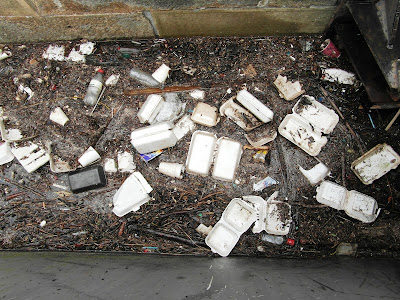This blog may help people explore some of the 'hidden' issues involved in certain media treatments of environmental and scientific issues. Using personal digital images, it's also intended to emphasise seasonal (and other) changes in natural history of the Swansea (South Wales) area. The material should help participants in field-based modules and people generally interested in the natural world. The views are wholly those of the author.
Thursday, 9 March 2023
Plastics, Plastics Everywhere and All the Boards Did Shrink!
The 5 Gyres Institute has collected (and analysed) data on marine plastic pollution. This Institute concentrated on the period 1979 to 2019, finding a marked increase in plastic pollution since 2005. 5 Gyres estimate that the world's oceans now have circa 170tn plastic 'particles' (https://www.theguardian.com/environment/2023/mar/08/plastic-particles-oceans-marine-pollution-production). The first question is what constitutes a particle? It's fairly obvious we are not talking about really small objects entering the food chains. Microparticles are generated by abrasion from these marine plastic objects. They also, however, directly enter the seas in road run-off from vehicle tyres and braking systems. The 5 Gyres Institute maintain that the plastics industry has to be made responsible for its own mess. This industry has singularly failed to set up meaningful recycling programmes. It also appears relatively uninterested in making its products more biodegradable. The 5 Gyres Institute believe we shouldn't have to rely on beach and open water cleaning/recycling, often carried out by volunteers.
Subscribe to:
Post Comments (Atom)
-
I n the UK and US, a pparently popular and successful vegan/vegetarian restaurants are reportedly closing or adding meat to their menus ( ...
-
Early ripening fruit may seem convenient but some folk think it confirms environmental stress. There's also a possibility th...


%20mating%20NWCW.jpg)


No comments:
Post a Comment